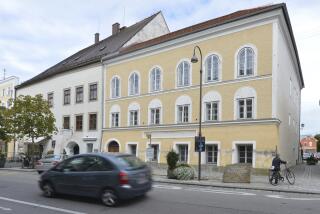Berlin Wall Will Be Pulled Down, East German Tells Havel
- Share via
The Berlin Wall, which symbolized the schism between Eastern and Western Europe for 28 years, will be pulled down, an East German official said today in a dramatic demonstration of the liberalization of the East Bloc.
East German head of state Manfred Gerlach told visiting Czechoslovak President Vaclav Havel that the wall will be torn down.
“We are pulling down the wall. It has become superfluous. It will be replaced by normal border markings,” Gerlach said in the interview with the West German daily, Bild.
Gerlach said that no date has been set for the wall’s removal but that the East German government would discuss it soon.
Bild said it interviewed him after he had taken Havel to see the wall and the historic Brandenburg Gate today.
Havel told reporters that he was amazed that the wall, built in 1961 and a symbol of Germany’s and Europe’s division until East Germany opened its borders in November, is still standing.
“Gerlach told me work would soon start to tear it down. I told him if he had any problems we could send some independent Czechoslovak workers to help free of charge,” he said to loud applause.
Havel also told journalists he would like to say “Ich bin ein Berliner” --”I am a Berliner”--as did President John F. Kennedy during his visit to Berlin in June, 1963, two years after the wall was built.
“I would like to take the liberty to repeat this sentence at a new time and in a new context,” Havel said.
He said all walls and barriers in Europe must fall.
Built by Soviet-backed East German troops Aug. 13, 1961, the wall was first breached last Nov. 9 as East German authorities were moving away from the Stalinist policies that had been their trademark for 40 years.
Havel visited the East German capital briefly before seeing West German Chancellor Helmut Kohl in Munich, his first official visits since he was elected president Friday as part of an agreement among the Czechoslovak government, opposition groups and the Communist Party.
His trips to the Germanys ahead of one to the Soviet Union reflected a shift in Czechoslovakia’s foreign policy.
Havel said his visits originally were to be symbolic but turned out to be “working visits.”
“We managed to discuss many concrete issues,” he said.
In response to a question, Havel said he is opposed to the death penalty but he said last week’s execution of Romanian leader Nicolae Ceausescu and his wife may have saved many lives.
After talks with Gerlach and Prime Minister Hans Modrow, Havel praised recent developments in East Germany, which has moved away from the Stalinist policies it had adhered to since its founding 40 years ago.
“All of us Europeans must thank the GDR (East Germany) for having started pulling down one of the worst walls,” said Havel, a playwright and essayist, who gained prominence during the spring 1968 uprising in Prague that was crushed by Warsaw Pact tanks.
“This decade must become the decade of Europeans,” said Kohl after meeting with Havel in Munich.
The Czechoslovakian leader also met with West German Foreign Minister Hans-Dietrich Genscher, President Richard von Weizsaecker and opposition leader Hans-Jochen Vogel.
Havel, who was jailed for five years for his opposition to the Communist authorities, was awarded the annual Peace Prize of the Frankfurt Book Fair last year. The Czechoslovakian government had prevented his traveling to West Germany to collect the award.
Earlier, Havel declared a New Year’s amnesty for common criminals and said his biggest task is to lead Czechoslovakia toward free elections without violence.
Czechoslovak Justice Minister Dagmar Buresova said in a radio address that the amnesty will be extensive because many prisoners are serving excessively harsh sentences. But she said corrupt public officials will be excluded from the amnesty.
It was not immediately clear how many prisoners will be affected by the amnesty.
More to Read
Sign up for Essential California
The most important California stories and recommendations in your inbox every morning.
You may occasionally receive promotional content from the Los Angeles Times.













